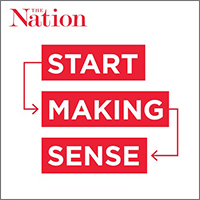 Listen HERE
Listen HERE
Trump’s nominee for Attorney General, William Barr, is more qualified to do the job than Matt Whitaker–but so are thousands of others. His record, however, show’s he as bad as Jeff Sessions—if not worse. David Cole, National Legal Director of the ACLU and The Nation’s legal affairs correspondent, explains.
Also: a report on The Nation’s investigation of Massive Accounting Fraud at the Pentagon – Dave Lindorff found that $21 million cannot be accounted for. For decades, he says, the Pentagon has been “deliberately cooking the books to mislead Congress.”
Plus: the Armenian Revolution: “a small light of hope and progressive democratic change in a Europe increasingly shadowed by authoritarian and dictatorial forces, especially in most of the former soviet-bloc states of Eastern Europe.” That’s what Marc Cooper says—he’s spent months in Yerevan, where elections on Sunday confirmed the victory of the revolutionaries. 12-12-18
 David Cole: Almost anybody will be an improvement on Matt Whitaker. I’m not sure that argument really addresses the real question: Whether this is the man we want to be the nation’s chief law-enforcement officer for the next two years.
David Cole: Almost anybody will be an improvement on Matt Whitaker. I’m not sure that argument really addresses the real question: Whether this is the man we want to be the nation’s chief law-enforcement officer for the next two years. Listen
Listen  Listen
Listen :max_bytes(150000):strip_icc()/1481824-56a1530d5f9b58b7d0be460a.jpg) The second-worst thing Bush did was his last act as president: pardoning many of the Iran/Contra conspirators, in order to block investigation of his own breaking the law. That points the way for Donald Trump to follow his example — by pardoning the people who might testify against him.
The second-worst thing Bush did was his last act as president: pardoning many of the Iran/Contra conspirators, in order to block investigation of his own breaking the law. That points the way for Donald Trump to follow his example — by pardoning the people who might testify against him. Listen
Listen  Listen
Listen  In LA, Michelle’s event was not at a bookstore, but rather at the Forum in Inglewood, where the Lakers used to play. It has 17,000 seats and was sold out for her event. She has similar venues in other cities. It’s not your typical author appearance. . . We’re interested in what the book has to say about politics, because hers were maybe more complicated than she let on. . . .
In LA, Michelle’s event was not at a bookstore, but rather at the Forum in Inglewood, where the Lakers used to play. It has 17,000 seats and was sold out for her event. She has similar venues in other cities. It’s not your typical author appearance. . . We’re interested in what the book has to say about politics, because hers were maybe more complicated than she let on. . . . Listen
Listen  Listen
Listen  Listen
Listen 
